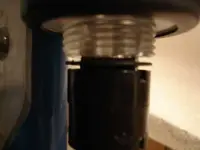gravediggermax-vabeachva
Bronze Member
- Joined
- Nov 24, 2005
- Messages
- 2,027
- Reaction score
- 474
- Golden Thread
- 0
- Location
- va beach, va
- 🏆 Honorable Mentions:
- 1
- Detector(s) used
- se pro, excal. II, ctx 3030
- Primary Interest:
- All Treasure Hunting
well now cavedweller
in like 19 years, i have had 4 excals - 3 of those 4 all suffered from crack battery plug or pod - once
mine occured when i left the rubber gasket out of the equation.................something happens - i did not image and just crack that plug for the picture and i have had the battery pod do the exact same thing once
u also have to watch out for water seeping by the rubber wire gasket from the other end...............maybe i imaged this also
in like 19 years, i have had 4 excals - 3 of those 4 all suffered from crack battery plug or pod - once
mine occured when i left the rubber gasket out of the equation.................something happens - i did not image and just crack that plug for the picture and i have had the battery pod do the exact same thing once
u also have to watch out for water seeping by the rubber wire gasket from the other end...............maybe i imaged this also
Attachments
Upvote
0




